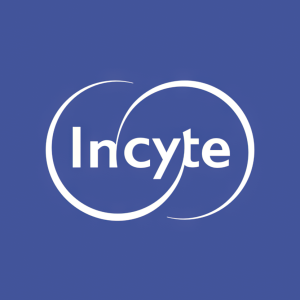Incyte Announces Positive Topline Results from Pivotal Study of Tafasitamab (Monjuvi®) in Relapsed or Refractory Follicular Lymphoma
- Phase 3 inMIND trial evaluating the efficacy and safety of tafasitamab (Monjuvi®) or placebo in combination with lenalidomide and rituximab met its primary endpoint of progression free survival (PFS) in relapsed or refractory follicular lymphoma (FL)
- Based on these results, Incyte expects to file a supplemental Biologics License Application for tafasitamab in combination with lenalidomide and rituximab in FL by the end of the year
The trial met its primary endpoint of progression free survival (PFS) by investigator assessment in FL. It also met key secondary endpoints of PFS in the overall population by investigator assessment as well as the positron-emission tomography-complete response rate in the FDG-avid FL population. In addition, the secondary endpoint of PFS results by blinded independent review are consistent with investigator based PFS results. No new safety signals with tafasitamab were observed.
“While many patients with follicular lymphoma initially benefit from first-line treatment, relapse of the disease is common, underscoring the need for additional therapies,” said Steven Stein, M.D., Chief Medical Officer, Incyte. “These results demonstrate the potential of tafasitamab added to the standard of care to be a meaningful new treatment option for patients with FL whose disease has progressed after at least one prior therapy.”
FL is the most common indolent, or slow growing, form of B-cell non-Hodgkin lymphoma (NHL) and accounts for approximately 13
Based on these positive results, Incyte expects to file a supplemental Biologics License Application for tafasitamab for the treatment of patients with FL who have failed at least one prior systemic anti-CD20 immunotherapy or chemo-immunotherapy by the end of the year.
The full inMIND data will also be submitted for presentation at an upcoming scientific meeting.
Tafasitamab was approved in combination with lenalidomide by the
About inMIND
A global, double-blind, randomized, controlled Phase 3 study, inMIND (NCT04680052) evaluated the clinical benefit of tafasitamab and lenalidomide as an add-on to rituximab compared with lenalidomide alone as an add-on to rituximab in patients with relapsed or refractory follicular lymphoma (FL) Grade 1 to 3a or relapsed or refractory nodal, splenic or extranodal marginal zone lymphoma (MZL). The study enrolled a total of 654 adults (age ≥18 years).
The primary endpoint of the study is progression-free survival (PFS) by investigator assessment in the FL population, and the key secondary endpoints are PFS in the overall population as well as positron emission tomography complete response (PET-CR) and overall survival (OS) in the FL population.
For more information about the study, please visit https://clinicaltrials.gov/study/NCT04680052.
About Tafasitamab
Tafasitamab (Monjuvi®) is a humanized Fc-modified cytolytic CD19 targeting monoclonal antibody. In 2010, MorphoSys licensed exclusive worldwide rights to develop and commercialize tafasitamab from Xencor, Inc. Tafasitamab incorporates an XmAb® engineered Fc domain, which mediates B-cell lysis through apoptosis and immune effector mechanism including Antibody-Dependent Cell-Mediated Cytotoxicity (ADCC) and Antibody-Dependent Cellular Phagocytosis (ADCP). MorphoSys and Incyte entered into: (a) in January 2020, a collaboration and licensing agreement to develop and commercialize tafasitamab globally; and (b) in February 2024, an agreement whereby Incyte obtained exclusive rights to develop and commercialize tafasitamab globally.
In
XmAb® is a registered trademark of Xencor, Inc.
Monjuvi, Minjuvi, the Minjuvi and Monjuvi logos and the “triangle” design are registered trademarks of Incyte.
IMPORTANT SAFETY INFORMATION
What are the possible side effects of MONJUVI?
MONJUVI may cause serious side effects, including:
- Infusion reactions. Your healthcare provider will monitor you for infusion reactions during your infusion of MONJUVI. Tell your healthcare provider right away if you get fever, chills, flushing, headache, or shortness of breath during an infusion of MONJUVI.
- Low blood cell counts (platelets, red blood cells, and white blood cells). Low blood cell counts are common with MONJUVI, but can also be serious or severe. Your healthcare provider will monitor your blood counts during treatment with MONJUVI. Tell your healthcare provider right away if you get a fever of 100.4°F (38°C) or above, or any bruising or bleeding.
- Infections. Serious infections, including infections that can cause death, have happened in people during treatment with MONJUVI and after the last dose. Tell your healthcare provider right away if you get a fever of 100.4°F (38°C) or above, or develop any signs and symptoms of an infection.
The most common side effects of MONJUVI include:
- Feeling tired or weak
- Diarrhea
- Cough
- Fever
- Swelling of lower legs or hands
- Respiratory tract infection
- Decreased appetite
These are not all the possible side effects of MONJUVI. Your healthcare provider will give you medicines before each infusion to decrease your chance of infusion reactions. If you do not have any reactions, your healthcare provider may decide that you do not need these medicines with later infusions. Your healthcare provider may need to delay or completely stop treatment with MONJUVI if you have severe side effects.
Call your doctor for medical advice about side effects. You may report side effects to FDA at 1-800-FDA-1088.
Before you receive MONJUVI, tell your healthcare provider about all of your medical conditions, including if you:
- Have an active infection or have had one recently.
- Are pregnant or plan to become pregnant. MONJUVI may harm your unborn baby. You should not become pregnant during treatment with MONJUVI. Do not receive treatment with MONJUVI in combination with lenalidomide if you are pregnant because lenalidomide can cause birth defects and death of your unborn baby.
- You should use an effective method of birth control (contraception) during treatment and for at least 3 months after your final dose of MONJUVI.
- Tell your healthcare provider right away if you become pregnant or think that you may be pregnant during treatment with MONJUVI.
- Are breastfeeding or plan to breastfeed. It is not known if MONJUVI passes into your breastmilk. Do not breastfeed during treatment for at least 3 months after your last dose of MONJUVI.
You should also read the lenalidomide Medication Guide for important information about pregnancy, contraception, and blood and sperm donation.
Tell your healthcare provider about all the medications you take, including prescription and over-the-counter medicines, vitamins, and herbal supplements.
Please see the full Prescribing Information for Monjuvi, including Patient Information, for additional Important Safety Information.
About Incyte
A global biopharmaceutical company on a mission to Solve On., Incyte follows the science to find solutions for patients with unmet medical needs. Through the discovery, development and commercialization of proprietary therapeutics, Incyte has established a portfolio of first-in-class medicines for patients and a strong pipeline of products in Oncology and Inflammation & Autoimmunity. Headquartered in
For additional information on Incyte, please visit Incyte.com or follow us on social media: LinkedIn, X, Instagram, Facebook,YouTube.
Incyte Forward-looking Statements
Except for the historical information set forth herein, the matters set forth in this press release, including statements regarding the potential for tafasitamab to provide a successful treatment option for patients with FL and Incyte’s expectations with respect to filing a supplemental Biologics License Application for tafasitamab, contains predictions, estimates and other forward-looking statements.
These forward-looking statements are based on Incyte's current expectations and subject to risks and uncertainties that may cause actual results to differ materially, including unanticipated developments in and risks related to: unanticipated delays; further research and development and the results of clinical trials possibly being unsuccessful or insufficient to meet applicable regulatory standards or warrant continued development; the ability to enroll sufficient numbers of subjects in clinical trials; determinations made by the
1 Al-Hamadani M, et al. Am J Hematol. 2015;90(9):790-795.
2 Chihara D, et al. Br J Haematol. 2014;164(4):536-545.
3 Perry AM, et al. Haematologica. 2016;101(10):1244-1250.
4 Teras LR, et al. CA Cancer J Clin. 2016;66(6):443-459.
5 Thandra KC, et al. Med Sci (
6 Decision Resources Group. Non-Hodgkin’s Lymphoma and Chronic Lymphocytic Leukemia, Landscape & Forecast. 2020.
View source version on businesswire.com: https://www.businesswire.com/news/home/20240815184197/en/
Incyte Contacts:
Media
media@incyte.com
Investors
ir@incyte.com
Source: Incyte







